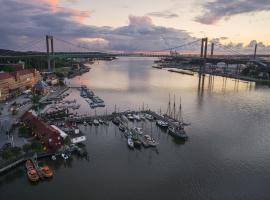On the project's side - Interview of the FED project

We interviewed Iréne Svensson, who is responsible for international relations at Johanneberg Science Park. She is the coordinator of Fossil-free Energy Districts (FED) project on behalf of the City of Gothenburg.
Why did your city decide to apply under Urban Innovative Actions?
The Urban Innovative Actions program reflected a dialogue about testing a micro-grid on Campus Johanneberg, that had been going on between the partners for over a year. The nine involved partners were in other words already identified and they had been collaborating successfully in other projects before. Suddenly, there was an opportunity go get funding for our innovative ideas and we could go from dream to realization. Understandably, a city like Gothenburg would have difficulties funding a high-risk initiative like this with tax money.
What do you consider to be the most innovative element of your project towards energy transition?
The Fossil-free Energy Districts – FED − project is about decreasing the use of fossil-based energy and increasing the security of supply on a district level. Nine strong partners are developing a local marketplace for electricity, district heating and cooling. A common marketplace, for all three energy types like this, is unique and has not been tested before.
What are the main changes that you expect to achieve in your municipality with this project?
The vision of the City of Gothenburg is to become fossil-free by 2030. FED will contribute in the best way to cutting peaks of fossil-based energy and reducing primary energy consumption. Our goals are an 80 percent cut of fossil-based energy peaks and 30 percent less primary energy consumption. An economic incentive for energy efficiency is added through the FED business model.
After six months of implementation, can you tell us where you are with the project and what are the main challenges you expect to be confronted to?
FED will have finished its system design overview, the second milestone, by the end of June 2017. The participating partners are now in the midst of their simulations, data collection, investment scenarios and marketplace design. The work packages are dependent of one another and the deliverables must be just in time. Timing is crucial for the ongoing process. And the prerequisites must be clear for each decision to be made.
FED includes both a technical solution and the socio-economic aspects of energy trade. A big challenge will be lobbying for a legislation that makes the marketplace for energy replicable on a larger scale.
An innovative project like FED requires a big commitment. For me, as a project coordinator, it is necessary to have a strong and present team. Every two weeks we have meetings with our partner representatives and work package leaders. In between these meetings, there is a close cooperation and knowledge exchange between all project participants. This working method works well, since everyone is present and engaged during the meetings.
We monitor and evaluate our progress through a Gantt chart, which is highlighted at every meeting. We also consider our monitoring plan and the specific milestones that it includes.
The City of Gothenburg will soon adopt an innovation strategy, which will take further advantage of innovative projects.



















